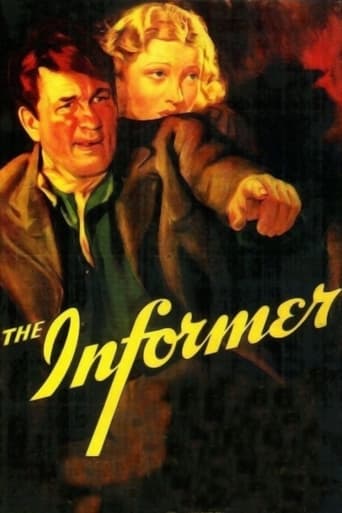Hitchcoc
This is John Ford's look at 1930's Ireland and a foolish man (Victor McLaghlan) who had no principles. He becomes tired when the IRA has expectations and leaves them. He sees his true love, a prostitute being approached by a John. She needs money to go to America, and because he is shiftless and self-centered, he turns in a former brother in the cause for twenty pounds. Once he has the money, he throws it away on drink. This is a sad film about the despair of certain Irish in a time of horrible events. McLaghlan is likable at times, but really does little that is noble.
gavin6942
Dublin, 1920. Gypo Nolan, strong but none too bright, has been ousted from the rebel organization and is starving. When he finds that his equally destitute sweetheart Katie has been reduced to prostitution, he succumbs to temptation and betrays his former comrade Frankie to the British authorities for a 20 pound reward.Along with Mutiny on the Bounty, The Informer was a big contender at the 8th Academy Awards, competing directly in all six categories they were nominated for (though Mutiny got eight nominations in total, given its ridiculous three Best Actor nominations). Though Mutiny on the Bounty ended up winning Best Picture, The Informer did win every other nomination, including Best Film Editing; Best Director for Ford, Best Actor for McLaglen, Best Writing Screenplay for Nichols, and Best Score. Well done regarding the Best Actor win, which was clearly an uphill battle.For many people, John Ford is best associated with westerns, or "Stagecoach" or John Wayne. And that is very fair. But before any of these, he had success with "The Informer". Ford, although born in America, was very proud of his Irish roots, and it is not surprising he would take on this project, along with a few other Irish-themed choices. His passion is clearly evident in the material.
barbb1953
Maybe it's because I looked up the history of the Irish troubles in the 1920s and then the sad Civil War that engulfed the Free State after the signing of the treaty before watching this movie. Anyway, the sudden turn at the end brought tears to my eyes.Victor McLaglen isn't as famous today as he was back then, and he should be better remembered. In this film, I think he's playing himself as he would have been without his innate talent and brains. For example, the scenes where his buddy in the crowd is challenging men to fight with him is probably quite reminiscent of what McLaglen actually did in earlier years, when he was a world-class bare-knuckles boxer. John Ford is partly responsible for that; the IMDb trivia section shows how he tricked McLaglen into getting a really bad hangover for the trial scene. This director also could bring out a lot in his actors, even without such tricks. Mostly, though, McLaglen is firmly in control, especially when his character is almost totally blotto (which is difficult for an actor to do believably), and he also plays Gypo Nolan with a depth and emotional power that is surprising for someone who has only seen McLaglen later in his career, in "The Quiet Man." I especially like the contrast between this role as an IRA man and the much more obviously controlled performance he gave as the IRA man Denis Hogan in "Hangman's House." In "The Quiet Man," of course, McLaglen is a country squire at odds with the local IRA. Victor McLaglen was big and bully, in the old-fashioned sense of the word, but he was a good actor, too, and capable of wide range and fine nuances of performance that we just wouldn't expect of a such a man today. It's a rather sad comment on our own set of expectations and prejudices.Ford, as usual, packs a lot into a little bit of film. All the characters are excellent (though the Commandant's mostly American accent is distracting) -- NOTE: There be spoilers ahead! -- Knowing that Gypo once drew the short straw and was ordered to kill a man but let him talk his way out of it instead, we really empathize with the man who draws the short straw for executing Gypo, and the humanity he shows, most notably when they go to take Gypo in Mary's room. John Ford really shows his genius here, taking what could have been a gruesome and yet expected outcome to the whole story and instead using it to set up a totally unexpected and yet very satisfying ending that makes us think not just of Gypo and the other characters, but of poor Ireland during that tortured time.
Marty
Victor McLaglen's performance is one of the finest in film history.I think we can all feel for "Gypo" because we've all struggled with what is right and what isn't and been wrong. This was one of the first art-house pictures to be released by a major American movie studio (RKO Radio Pictures).Joseph H. August's cinematography is at its very best here. However, August's stunning portion was mostly overlooked; he didn't receive the Oscar nomination he rightly deserved.This is a psychological drama, with thought, philosophy, sadness, all conveyed with as little words as possible.



